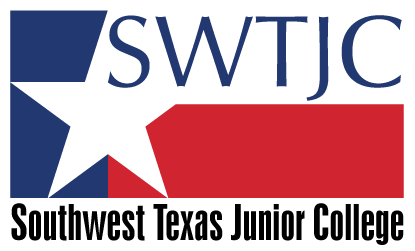3.4.6 Practices For Awarding Credit
The institution employs sound and acceptable practices for determining the amount and level of credit awarded for courses, regardless of format or mode of delivery.
JUDGMENT: ![]() Compliant
Compliant
STATEMENT OF RATIONALE FOR JUDGMENT OF COMPLIANCE
Southwest Texas Junior College follows national and State-accepted practices of awarding credit based on semester credit hours. The definition for semester credit hours is taken from the Texas Higher Education Coordinating Board (THECB) Lower Division Academic Course Guide (ACGM) manual:
A traditional course offered for 48 contact hours of lecture over a 16-week semester will earn three semester credit hours […] Similarly, a traditional lecture/lab course offered for 48 contact hours of lecture and 32 contact hours of laboratory over a 16-week semester would earn four semester credit hours […] In general, one semester credit hour is awarded per 16 contact hours of lecture instruction and one semester credit hour is awarded per 32 to 48 contact hours of laboratory instruction. (p. 3)
SWTJC applies this definition for determining the amount and level of course credit offered. The College employs the same practices for awarding credit, regardless of the format or mode of instructional delivery. In addition, two manuals provided by and approved by the Texas Higher Education Coordinating Board govern the amount and level of credit that Texas community colleges may award for courses.
The Lower Division Academic Course Guide Manual (ACGM) provides the official list of courses approved for academic transfer that may be offered for state funding by Texas public community and technical colleges. In its presentation of those courses, the ACGM also outlines the permitted number of contact hours and semester credit hours that may be awarded, as well as basic course descriptions.
All Technical/vocational courses which SWTJC is eligible to offer are listed and described in the Texas Workforce Education Course Manual (WECM). This Manual indicates all course pre-requisites as well as basic learning outcomes. The WECM also indicates the allowable range of contact hours and semester credit hours for all courses. The WECM is embedded in chapter 4 of the Guidelines for Instructional Programs in Workforce Education (GIPWE). The Texas Higher Education Coordinating Board provides the GIPWE for Texas colleges to guide the design, development, operation, and evaluation of credit and non-credit workforce education programs.
In addition, Southwest Texas Junior College utilizes the Texas Common Course Numbering System (TCCN), which provides for consistency and commonality in assigning semester credit hour value to individual courses. Common course numbers are used in course inventories of both the ACGM and the WECM.
The SWTJC Curriculum Committee has an established process for approval of new courses, course modification, program modification, and new program proposals. Required documentation and its review assure that courses and programs provide the appropriate amount and level of credit.
Distance Education
Consistent practices for awarding credit are followed at SWTJC, regardless of course delivery method. All courses offered by SWTJC, whether via face-to-face classes, video conferencing, online, or hybrid, adhere to the same established practices. All courses, regardless of delivery mode, must use a syllabus derived from a Master Syllabus, which has been developed by discipline faculty. Among the standard elements of a course syllabus is the semester credit value of the course.
Southwest Texas Junior College provides all instruction for course work necessary for all degrees and certificates. Course requirements are recorded in the Catalog and course offerings are published each semester in the course schedule. Both documents are available on the College website.
On occasion, a student may choose an elective course for which SWTJC does not provide instruction. In those cases, the student may arrange to take the course through the Virtual College of Texas (VCT). The VCT is a State-wide consortium of two-year colleges designed to allow “Host” institutions to transcript courses offered by “Provider” institutions. Students are actually enrolled in “Host” colleges, which are responsible for the quality of instruction and providing all related services.
For example, at this writing SWTJC is not able to offer Physics, which a student may wish to take as an elective or to satisfy a Science requirement. In this event SWTJC, as the “Host” college, contracts with a VCT “Provider” college to make the course available to the student online. The SWTJC Vice President of Academic Affairs confirms the unavailability of the course at SWTJC, reviews the credentials of the “Provider” college’s assigned faculty member, validates the accuracy of the “Provider” course number and title, reviews the course syllabus, and allows or disallows the course via SWTJC documentation. This process is followed for all student requests to enroll in a VCT course.
In a 2007 Memorandum from SACSCOC President, Dr. Belle Wheelan, SWTJC was confirmed as an approved institution to participate in the Virtual College of Texas.
Evidence
Academic Course Guide Manual
Workforce Education Course Manual
SWTJC Faculty Handbook 2014, p. 120
SWTJC Faculty Handbook 2014, pp. 53-55
SWTJC Master Syllabus Samples
SWTJC Catalog, 2014-2016, pp. 108-110
SWTJC Course Schedule Fall 2014
SWTJC Website Catalog and Course Schedule
SWTJC VCT Request Form Samples
Commission on Colleges VCT Approval Memorandum, July 12, 2007


